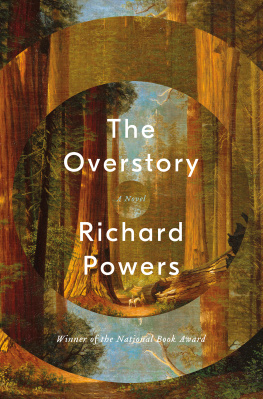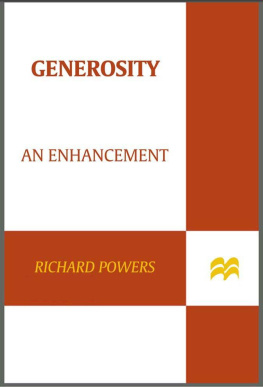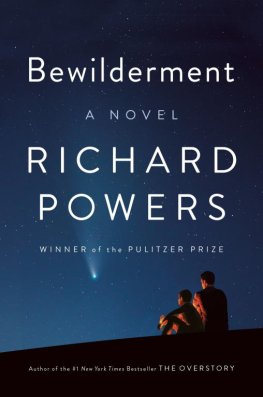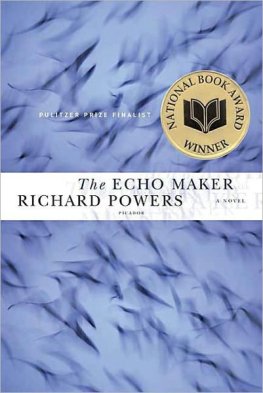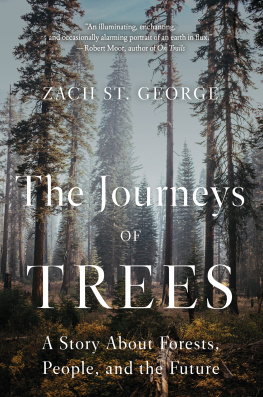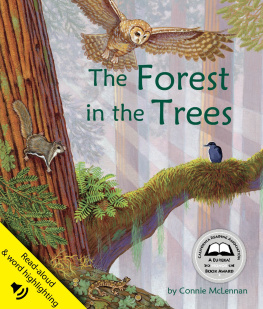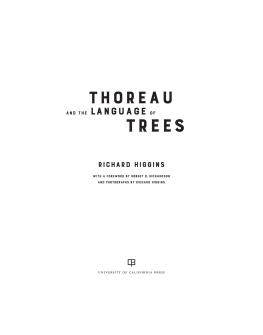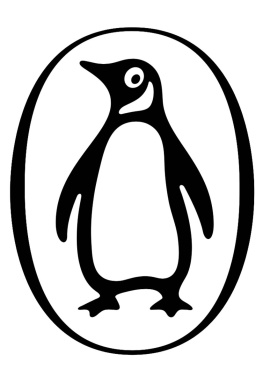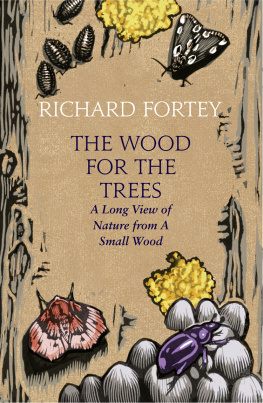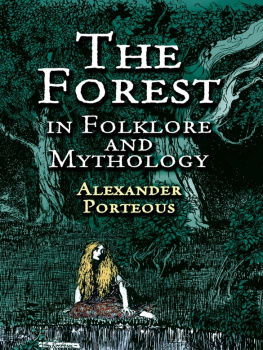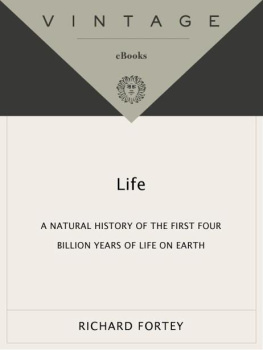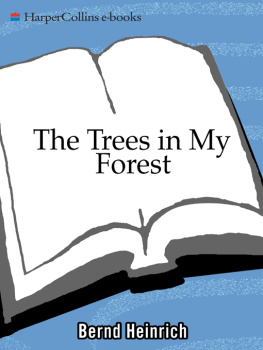
THE
OVERSTORY
A NOVEL

RICHARD POWERS

W. W. NORTON & COMPANY
Independent Publishers Since 1923
NEW YORK LONDON
F irst there was nothing. Then there was everything.
Then, in a park above a western city after dusk, the air is raining messages.
A woman sits on the ground, leaning against a pine. Its bark presses hard against her back, as hard as life. Its needles scent the air and a force hums in the heart of the wood. Her ears tune down to the lowest frequencies. The tree is saying things, in words before words.
It says: Sun and water are questions endlessly worth answering.
It says: A good answer must be reinvented many times, from scratch.
It says: Every piece of earth needs a new way to grip it. There are more ways to branch than any cedar pencil will ever find. A thing can travel everywhere, just by holding still.
The woman does exactly that. Signals rain down around her like seeds.
Talk runs far afield tonight. The bends in the alders speak of long-ago disasters. Spikes of pale chinquapin flowers shake down their pollen; soon they will turn into spiny fruits. Poplars repeat the winds gossip. Persimmons and walnuts set out their bribes and rowans their blood-red clusters. Ancient oaks wave prophecies of future weather. The several hundred kinds of hawthorn laugh at the single name theyre forced to share. Laurels insist that even death is nothing to lose sleep over.
Something in the airs scent commands the woman: Close your eyes and think of willow. The weeping you see will be wrong. Picture an acacia thorn. Nothing in your thought will be sharp enough. What hovers right above you? What floats over your head right nownow?
Trees even farther away join in: All the ways you imagine usbewitched mangroves up on stilts, a nutmegs inverted spade, gnarled baja elephant trunks, the straight-up missile of a salare always amputations. Your kind never sees us whole. You miss the half of it, and more. Theres always as much belowground as above.
Thats the trouble with people, their root problem. Life runs alongside them, unseen. Right here, right next . Creating the soil. Cycling water. Trading in nutrients. Making weather. Building atmosphere. Feeding and curing and sheltering more kinds of creatures than people know how to count.
A chorus of living wood sings to the woman: If your mind were only a slightly greener thing, wed drown you in meaning.
The pine she leans against says: Listen. Theres something you need to hear.

NOW IS THE TIME of chestnuts.
People are hurling stones at the giant trunks. The nuts fall all around them in a divine hail. It happens in countless places this Sunday, from Georgia to Maine. Up in Concord, Thoreau takes part. He feels he is casting rocks at a sentient being, with a duller sense than his own, yet still a blood relation. Old trees are our parents, and our parents parents, perchance. If you would learn the secrets of Nature, you must practice more humanity....
In Brooklyn, on Prospect Hill, the new arrival, Jrgen Hoel, laughs at the hard rain his throws bring down. Each time his stone hits, food shakes down by the shovelful. Men dash about like thieves, stuffing caps, sacks, and trouser cuffs with nuts freed from their enclosing burrs. Here it is, the fabled free banquet of Americayet one more windfall in a country that takes even its scraps right from Gods table.
The Norwegian and his friends from the Brooklyn Navy Yard eat their bounty roasted over great bonfires in a clearing in the woods. The charred nuts are comforting beyond words: sweet and savory, rich as a honeyed potato, earthy and mysterious all at once. The burred husks prickle, but their No is more of a tease than any real barrier. The nuts want to slip free of their spiny protection. Each one volunteers to be eaten, so others might be spread far afield.
That night, drunk on roasted chestnuts, Hoel proposes to Vi Powys, an Irish girl from the pine-framed row houses two blocks from his tenement, on the edge of Finn Town. No one within three thousand miles has the right to object. They marry before Christmas. By February, they are Americans. In the spring, the chestnuts bloom again, long, shaggy catkins waving in the wind like whitecaps on the glaucous Hudson.
Citizenship comes with a hunger for the uncut world. The couple assemble their movable goods and make the overland trip through the great tracts of eastern white pine, into the dark beech forests of Ohio, across the midwestern oak breaks, and out to the settlement near Fort Des Moines in the new state of Iowa, where the authorities give away land platted yesterday to anyone who will farm it. Their nearest neighbors are two miles away. They plow and plant four dozen acres that first year. Corn, potatoes, and beans. The work is brutal, but theirs. Better than building ships for any countrys navy.
Then comes the prairie winter. The cold tests their will to live. Nights in the gap-riddled cabin zero their blood. They must crack the ice in the water basin every morning just to splash their faces. But they are young, free, and driventhe sole backers of their own existence. Winter doesnt kill them. Not yet. The blackest despair at the heart of them gets pressed to diamond.
When its time to plant again, Vi is pregnant. Hoel puts his ear to her belly. She laughs at his awe-slapped face. What is it saying?
He answers in his blunt, thumping English. Feed me!
That May, Hoel discovers six chestnuts stuffed in the pocket of the smock he wore on the day he proposed to his wife. He presses them into the earth of western Iowa, on the treeless prairie around the cabin. The farm is hundreds of miles from the chestnuts native range, a thousand from the chestnut feasts of Prospect Hill. Each month, those green forests of the East grow harder for Hoel to remember.
But this is America, where men and trees take the most surprising outings. Hoel plants, waters, and thinks: One day, my children will shake the trunks and eat for free.
...
THEIR FIRSTBORN DIES in infancy, killed by a thing that doesnt yet have a name. There are no microbes, yet. God is the lone taker of children, snatching even placeholder souls from one world to the other, according to obscure timetables.
One of the six chestnuts fails to sprout. But Jrgen Hoel keeps the surviving seedlings alive. Life is a battle between the Maker and His creation. Hoel grows expert at the fight. Keeping his trees going is trivial, compared to the other wars he must wage each day. At the end of the first season, his fields are full and the best of his seedlings stands over two feet tall.
In four more years, the Hoels have three children and the hint of a chestnut grove. The sprigs come up spindly, their brown stems lined with lenticels. The lush, scalloped, saw-toothed, spiny leaves dwarf the twigs they bud from. Aside from these starts and a few scattered bur oaks in the bottomlands, the homestead is an island in a grassy sea.
Even the skinny starts already have their uses:
Tea from infant trees for heart trouble,
leaves from young sprouts to cure sores,
cold bark brew to stop bleeding after birth,
Next page
